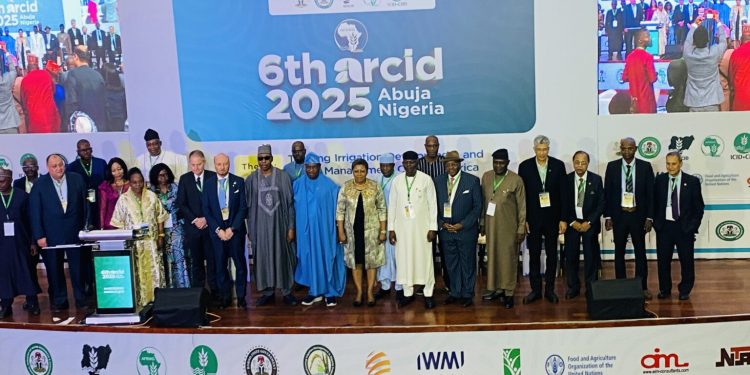On Monday, President Bola Tinubu declared a national emergency on food security, emphasizing the need for expanded irrigation infrastructure and improved water resource management across Nigeria. He made the announcement while opening the 6th African Regional Conference on Irrigation and Drainage in Abuja, represented by the Secretary to the Government of the Federation, George Akume.
Tinubu urged African nations to adopt innovative strategies to tackle the continent’s ongoing challenges in irrigation and water management, which include inadequate infrastructure, financial constraints, climate change, and governance issues. He described the conference’s theme, “Tackling Irrigation Development and Water Management Crisis in Africa”, as a critical call for action toward sustainable agriculture and economic resilience.
Highlighting the country’s irrigation potential, Tinubu pointed out that Nigeria has over 3.1 million hectares of irrigable land, particularly around key river basins like the Niger and Benue.
Prof. Joseph Utsev, the Minister of Water Resources and Sanitation, spoke about ongoing projects aimed at improving irrigation management in Nigeria. He mentioned the successful completion of the Transforming Irrigation Management in Nigeria (TRIMING) project and the upcoming Sustainable Power and Irrigation for Nigeria (SPIN) project. The SPIN initiative, in collaboration with the World Bank, will build upon the successes of TRIMING, addressing any remaining gaps and optimizing the economic potential of Nigeria’s water resources to support food security.
The TRIMING project, which lasted over seven years, delivered several significant accomplishments, including the completion of the Dadin-Kowa and Bakolori irrigation schemes, and nearly finishing the Middle Rima Valley irrigation project. The project also contributed to water governance by establishing Water Users Associations and providing support to farmer management centers and market linkages for agricultural value chains such as rice and tomato.
Utsev also noted that more than 153,000 hectares of irrigable land had been developed by the River Basin Development Authorities, which are now being partially commercialized to attract private sector investment. He added that the 2025 Flood Outlook and Risk Management Strategy was being developed to minimize flood-related agricultural impacts.
Dr. Didi Wilson-Jack, the Head of the Civil Service of the Federation, called for renewed commitment across all levels of government to ensure national food security. Former Permanent Secretary of the Ministry of Water Resources, Mr. Godknows Igali, highlighted the importance of strategic planning and proper management of river basins to meet Nigeria’s growing population demands. He stressed that sub-national governments must be more engaged in water governance and food systems.
Borno State Governor Babagana Zulum raised concerns about the shrinking farming seasons caused by climate change and unpredictable rainfall patterns. He emphasized the necessity of irrigation for maintaining agricultural productivity, noting that innovation in irrigation should be accessible to all, particularly empowering women and youth in agriculture.
Dr. Marco Arcieri, President of the International Commission on Irrigation and Drainage, described the conference as a timely and essential gathering to address Africa’s irrigation challenges. He expressed commitment to supporting Africa through population growth and climate stress.
The conference, which runs through April 17, features technical sessions, policy dialogues, and field visits to irrigation sites across Nigeria. The event aims to foster innovative solutions to Africa’s irrigation development needs.










